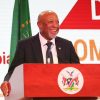Omanyano ovanhu koikundaneki yomalungula kashili paveta, Commisiner Sakaria takunghilile
Veronika Haulenga
Omanyano ovanhu koikundaneki yomalungula kashili paveta, Commisiner Sakaria takunghilile
Veronika Haulenga
Listeners:
Top listeners:
-
play_arrow
Omanyano ovanhu koikundaneki yomalungula kashili paveta, Commisiner Sakaria takunghilile Veronika Haulenga
Joint ECOWAS-UEMOA Regional Consultation on Axle-Load Control on Community Road Networks in Member States
To find a solution to the issue of overloading of heavy goods vehicles, which continues to contribute to road deterioration, transport sector experts from ECOWAS and UEMOA member states, regional road haulage organizations, civil society and technical partners met from September 26 to 27, 2024 in Cotonou, Benin. The aim of this hybrid technical meeting, jointly organized by the ECOWAS and UEMOA Commissions, was to assess the level of implementation of the ECOWAS Supplementary Act on the Harmonization of Standards and Procedures for Checking the Dimensions, Weights and Axle Loads of Goods Vehicles in West Africa, harmonized with UEMOA Regulation 14.
The aim of this technical meeting was to agree on the key actions to be undertaken by the ECOWAS and UEMOA Commissions, member states, transport operators, other stakeholders (ports, industries, mines, shippers, etc.) as well as technical and financial partners, for the implementation of the new Harmonized Supplementary Act on axle load control. At the end of the two days of discussions, several recommendations were adopted.
Among other things, it was recommended that the ECOWAS and UEMOA Commissions forward the signed harmonized regional Supplementary Act to member states and finalize the harmonized regional action plan for its implementation, with a timetable and actions to support the professionalization and renewal of the hauliers’ fleet, as well as the removal of non-tariff barriers to facilitate the fluidity of transport corridors. They are also asked to support member states in setting up the appropriate institutional framework to guide the uniform implementation of the additional act.
Member states were also asked to raise awareness among actors and stakeholders of the implementation of the Supplementary Act, and to initiate awareness-raising among transport operators and civil society. As for technical and financial partners, they were asked to support ECOWAS and UEMOA in the regional coordination of the implementation of the Additional Act on axle load control. Finally, transport and civil society players were recommended to participate in awareness-raising and to collaborate with the International Transport Workers’ Federation (ITF), ECOWAS and UEMOA to support efforts to professionalize the transport industry in West Africa.
At the opening of this technical meeting on Thursday, September 26, 2024, H.E. Amadou DIONGUE, ECOWAS Resident Representative in Benin, on behalf of H.E. Dr Omar Alieu TOURAY, President of the ECOWAS Commission and Commissioner Sédiko DOUKA in charge of
Infrastructure, Energy and Digitization, thanked the participants and recalled the importance of the additional act for member states and for the regional economy.
“This additional act is very important when we consider the future that awaits us. With the adoption of studies on the construction of the Abidjan-Lagos Corridor Motorway, it has been demonstrated that this road axis will support over 75% of community trade, thus strengthening our regional integration”.
He was followed by Mr Chris APPIAH, Acting Director of Transport for ECOWAS, who outlined the history of this additional act and the various contacts with ECOWAS and UEMOA member states, technical partners and bodies responsible for the legality of regional texts.
“Progress has been made, but many challenges remain. It is also hoped that West Africa can draw inspiration from the experience of the 3 economic regions of Southern Africa (EAC, SADEC and COMESA), which have joined forces under the name TRIPARTITE to adopt a single management and control protocol for road axes, thus reinforcing the African integration advocated by the African Union”, concluded Mr. APPIAH.
Mr. Aboubakar Sidiki TOURE, Director of Infrastructure at UEMOA, also reported on the progress made, in particular the reduction in the rate of overloading on the roads. “Nevertheless, there are still challenges to be met as long as regional road infrastructures continue to be damaged by heavy goods vehicles”, he added. He assured the meeting of UEMOA’s commitment to collaborate with ECOWAS and Member States to implement the new Supplementary Act which replaces the erstwhile UEMOA Regulation 14 and ECOWAS Supplementary Act of 2012 on Overload Control.
As a reminder, the 61st Summit of ECOWAS Heads of State and Government on July 7, 2022, approved and adopted the ECOWAS Supplementary Act A/SA.3/07/22 amending Supplementary Act/SP.17/02/12 on the harmonization of standards and procedures for the control of the dimensions, weight and axle load of goods vehicles in West Africa, harmonized with WAEMU Regulation 14. Subsequently, the 65th Summit held on July 7, 2024 in Abuja, Nigeria, noted the continuing excessive damage caused to community roads by overloading, and called on member states to comply with the axle-load li-mits in the new harmonized community text on overloaded transport trucks, leading to the premature deterioration of roads built with the limited financial resources of member states.
Distributed by APO Group on behalf of Economic Community of West African States (ECOWAS).
Similar posts
Windhoek Weather
Most popular

Mbumba signs off new benefits for retired political office bearers

Former FNB employee arrested after defraud pensioner off N$215, 000

Namdia Heist: More questions, lots of confusion

Omuhwahwameki Michael okuunganeka oshikonga shoku patitha oostola dho Rani moshilongo ashihe.

Walvis Bay woman loses over N$777.000 to a fraudster
Copyright 2025 Future Media (Pty) Ltd | Website by Digital Platforms
Tel: +264 83 000 1000 | Email: news@futuremedia.com.na



